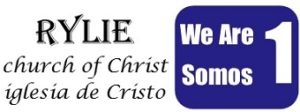Bulleting for 6-26-22
Birthdays and Anniversaries:
6-24 Giovanni Mendoza
6-28 Mauricio & Gladys Ramirez
6-30 Regena Reames
Prayer requests:
Sam & Alice Pirozzo have been fighting the covid virus.
Paul Tyler has a bad sort Parkinson’s. Please pray for him. His granddaughter, Michelle, scheduled for surgery
Darlyne Stewart, Karl’s sister, having some breathing problems due to treatments.
Shirley Weeks, Steve’s mom, had a fall this week.
Sharon Best, Steven’s mom, finished chemo, declared in remission.
Sarah, Chris Girvin’s sister, on hospice care
Robert and Sue Waller, health issues.
Darla Nitti, Wendi’s mom, doing fairly well
Leta, has a recurring cancer, prayer request from her granddaughter via our website.
Tammy Jones, Weeks’ neighbor, kidney failure/dialysis
Article:
And he delivered them
“Let the redeemed of the LORD say so, whom he has redeemed from trouble” (Psalm 107:2).
The history of God and his people is one of faithfulness and fickleness. God is faithful to his promises, to himself, and to truth. His people are fickle with regard to their commitments, to their relationships, and to intellectual consistency.
God is not us, and that is why he is worthy to be praised. He is always good. His steadfast love endures forever. Therefore, we should give thanks to Jehovah!
The 107th Psalm calls the wise to “consider the steadfast love of the LORD” (Psalm 107:43). It beautifully demonstrates God’s goodness and power as he delivers men from weariness to rest (vv. 4-9), from darkness to light (vv. 10-16), from sickness to health (vv. 17-22), and from danger to safety (vv. 22-31).
The structure of this Psalm shows the condition of some of God’s people, their petition to Jehovah, their salvation by his mighty hand, and an invitation to praise him. Let’s examine the structure in two of these sections.
From weariness to rest (Psalm 107:4-9)
Their condition: “Some wandered in desert wastes, finding no way to a city to dwell in; hungry and thirsty, their soul fainted within them.”
Their petition: “Then they cried to the LORD in their trouble”
Their salvation: “and he delivered them from their distress. He led them by a straight way till they reached a city to dwell in.”
Their invitation: “Let them thank the LORD for his steadfast love, for his wondrous works to the children of man! For he satisfies the longing soul, and the hungry soul he fills with good things.”
From darkness to light (Psalm 107:10-16)
Their condition: “Some sat in darkness and in the shadow of death, prisoners in affliction and in irons, for they had rebelled against the words of God, and spurned the counsel of the Most High. So he bowed their hearts down with hard labor; they fell down, with none to help.”
Their petition: “Then they cried to the LORD in their trouble”
Their salvation: “and he delivered them from their distress.”
Their invitation: “Let them thank the LORD for his steadfast love, for his wondrous works to the children of man! For he shatters the doors of bronze and cuts in two the bars of iron.”
In the first case, the people were weary from wandering. Despite their best efforts they could find no rest, no permanent dwelling. They were without food and water, and their souls fainted within them.
Without God we are all lost and without direction. We might know we are lost, but we lack the vision to find rest. As the great shepherd, God gives direction to his people. His laws hem them in, his mercy leads them to nourishment and rest.
“So then, there remains a Sabbath rest for the people of God, for whoever has entered God’s rest has also rested from his works as God did from his. Let us therefore strive to enter that rest so that no one may fall by the same sort of disobedience” (Hebrews 4:9-11).
In the second case, the people were punished because of their rebellion. They rejected the words of God and spurned his counsel. Their disobedience led to darkness, their defiance to the doorway of death.
Sin binds and blinds us. Sin enslaves us and darkens our understanding of the freedom in Christ. The path of wickedness is darkness, “but the path of the righteous is like the light of dawn” (Proverbs 4:18).
God has, “delivered us out of the domain of darkness” (Colossians 1:13), and called us “into his marvelous light” (1 Peter 2:9).
Psalm 107 is instructive to the Christian. It may be ignorance, rebellion, foolishness, or weakness that has caused you to be in distress. Whatever the cause, the solution is the same. In humility cry out to the LORD, he is faithful to deliver you.
Let us all thank the LORD for his steadfast love, for his wonderful works to the children of man!
Lee Parish, link to original article
